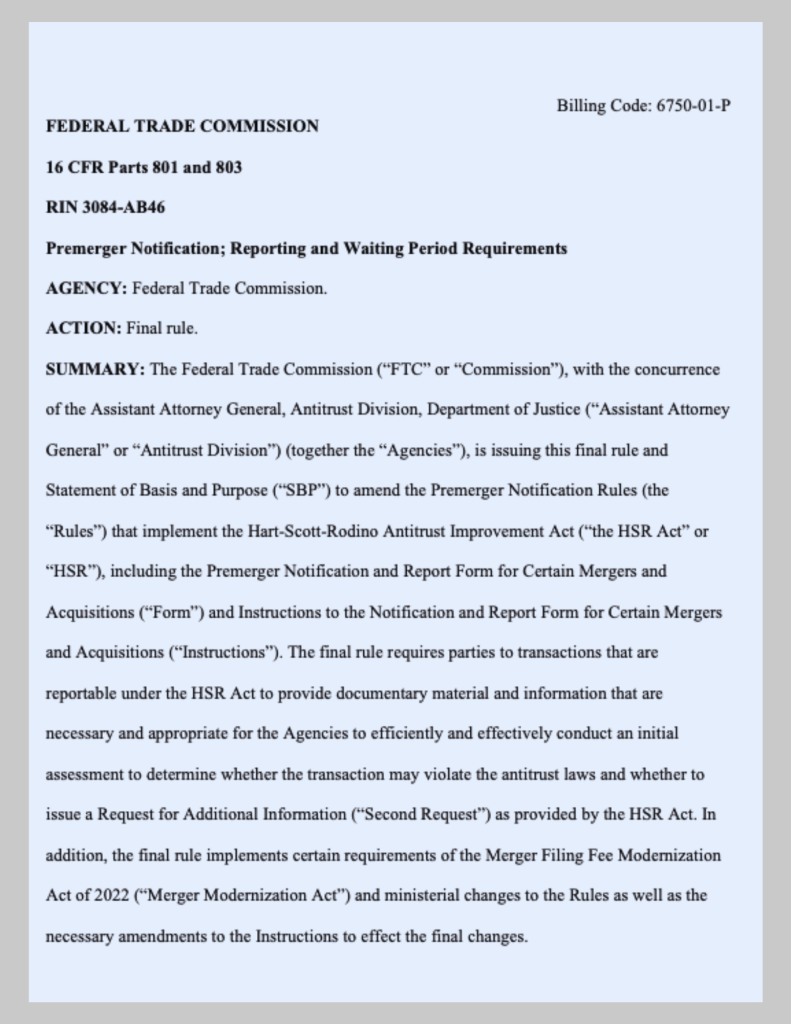Government says additional information will help prevent anticompetitive mergers.
In addition to issuing their report on the effectiveness of the Hart-Scott-Rodino Act (see our post), the Department of Justice Antitrust Division and the Federal Trade Commission earlier this month agreed on a final rule to implement the first large-scale material update to the HSR notification form since first established in 1978.
“Access to better information at the beginning of the merger review process ensures that the antitrust agencies can devote our resources to the most important issues and reduces the burden on filers, third parties and other market participants,” said Jonathan Kanter, assistant attorney general of the DOJ’s Antitrust Division, said in his announcement of the final rule.
Additions to the HSR form include:
- Requiring parties to submit transaction-related documents prepared by or for the supervisory leader of the deal team.
- Requiring parties to describe their principal categories of products and services as reflected in the parties’ ordinary course business documents.
- Requiring disclosure of additional information about the buyer’s officers, directors and investors, including those with management rights over the firm.
- Ensuring agencies have access to translations of all documents submitted in a language other than English.
 The threshold for requiring HSR reporting was $111.4 million in 2023, which is raised yearly based on inflation. For 2024, the threshold is $119.5 million. Merger transactions fell in 2023 to more typical levels following a massive spike in reportable deals in 2021 and 2022. For the three years before the pandemic, between 2,050 and 2,150 deals were reported in each calendar year. However, that number spiked to 3,520 in 2021 and 3,152 in 2022.
The threshold for requiring HSR reporting was $111.4 million in 2023, which is raised yearly based on inflation. For 2024, the threshold is $119.5 million. Merger transactions fell in 2023 to more typical levels following a massive spike in reportable deals in 2021 and 2022. For the three years before the pandemic, between 2,050 and 2,150 deals were reported in each calendar year. However, that number spiked to 3,520 in 2021 and 3,152 in 2022.
Not everyone is happy about the changes. When they were proposed, the U.S. Chamber of Commerce said they would “subject thousands of businesses each year to costly and unnecessary new burdens,” with smaller and middle-market businesses being hit the hardest. The Chamber maintained the new regime would cost businesses $2 billion a year “with no identifiable benefit.”
Shaoul Sussman, Associate Director for Litigation of the FTC’s Bureau of Competition, disagreed on the value of the changes. “Premerger review is a critical task for the antitrust agencies and to do it well, we need information about each deal’s potential antitrust risk. This rulemaking is a much needed update to address changes in the marketplace that have undermined the agencies’ ability to detect and prevent illegal mergers, while at the same time creating a more efficient review process.”
